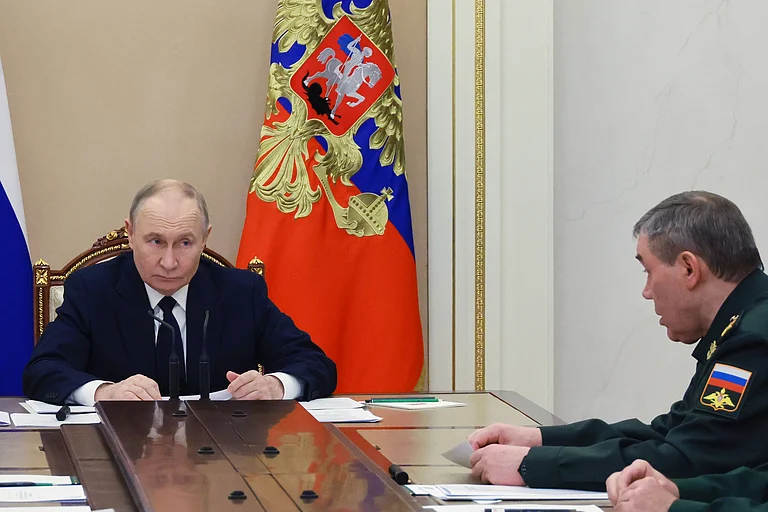Russian leader Vladimir Putin has become President for the fifth time defeating his opponents in a landslide victory. The results announcing Putin's win were declared on Monday, with him securing 87 per cent of the total votes, according to the Central Election Commission of Russia.
The Russian President will be extending his rule to nearly a quarter-century with a six-year term secured following his victory. Putin's win will make him the longest-serving leader for more than 200 years, overtaking Josef Stalin.
In his victory speech in Moscow, Putin said he would prioritise resolving tasks related to Russia's "special military operation" in Ukraine and strengthen the Russian military.
"We have many tasks ahead. But when we are consolidated - no matter who wants to intimidate us, suppress us - nobody has ever succeeded in history, they have not succeeded now, and they will not succeed ever in the future," he said, as per Reuters.
The Russian elections began on Friday and lasted through Sunday, with polling taking place in over 89 regions. However, over the years, Russian elections have gained a reputation for being rigged, turning into mere formalities where only one candidate has emerged victorious for the past two decades.
What is the election process in Russia?
In Russia, individuals aged 35 and above who have resided in the country for at least a decade can run for president. They must be nominated by an election bloc or directly by citizens, with a minimum of 1,000,000 signatures gathered from over 15 regions.
The electoral process is managed by local, regional, and national election commissions, supported by the Central Election Commission in Moscow and local executive authorities.
The country is divided into 89 regions, further subdivided into 2,700 territories representing cities and other local units.
Voting will also occur in what Russia refers to as its new territories — regions of Ukraine currently under Russian control and governed by Russian law.
Any Russian citizen above 18 years of age, not imprisoned due to a criminal conviction, can vote. The Central Election Commission reports 112.3 million eligible voters in Russia and Russian-occupied parts of Ukraine, with an additional 1.9 million eligible voters residing abroad.
Candidates in the running
Apart from Putin, three more candidates were in the running.
Nikolai Kharitonov was the official candidate of the Communist Party, a party which has finished a distant second to Putin at every election since 2000. The 75-year-old politician is a member of the lower house of the Russian parliament and finished second in the presidential race with just under 4 per cent votes secured.
Vladislav Davankov, another candidate challenging Putin, finished third according to Reuters reports. Davankov is the Deputy Chairman of the State Duma and a lawmaker for the New People political party. At 40, he was the youngest candidate and has received various state awards, including one from Putin. Davankov has positioned himself as a proponent of personal freedom and, in Russian politics, leans towards liberalism.
Leader of the ultra-nationalist Liberal Democratic Party of Russia (LDPR), Leonid Slutsky finished fourth.
Candidates who wanted to run for president
Former TV journalist Yekaterina Duntsova, 40, had wanted to contest the Presidential elections but was disqualified by Russian election officials for alleged “numerous violations" in her candidacy papers. Duntsova advocated for peace in Ukraine and the release of political prisoners.
Boris Nadezhdin, 60, attempted a long-shot anti-war campaign but was disqualified by the Central Election Commission (CEC) in February. He openly criticised Russia's military operation in Ukraine, calling it a "fatal mistake" and promising to end it through negotiations.
Alexei Navalny, who died at 47 in a Russian prison in February, aspired to be Russia's president and was a fierce critic of Putin. His supporters accuse Putin of orchestrating his murder, a claim the Kremlin denies.




























